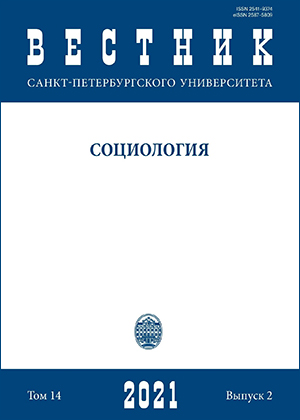The efficiency of communication strategies of politically oriented communities on the Internet
DOI:
https://doi.org/10.21638/spbu12.2021.204Abstract
The Internet as a special space for political activity and political communication is becoming more and more attractive to political actors. The intensification of political activity on the Internet leads to the increase of researchers’ interest. One of the prominent areas of this research is the analysis of the efficiency of communication strategies used by politically oriented communities on the Internet. The results of such assessment contribute to, in particular, characterizing the level and features of the political engagement of Internet users into political processes. To study these processes, a telephone survey of residents of St. Petersburg was conducted. St. Petersburg was chosen because it is one of the largest cities in Russia with high Internet coverage and a high level of political activity compared to other regions. The results showed that politically oriented communities effectively implement primary communication strategies — information and presentation. More than two-thirds of politically active Internet users in St. Petersburg noted that visiting the relevant resources helped them to understand the political situation, to define their attitude toward parties, politicians, social movements and organizations. At the same time, the strategy of supporting political identification has not yet worked for the majority of users. Perhaps this is a consequence of the fact that the majority of St. Petersburg citizens have not yet found appropriate political leaders and organizations.
The authors found that the majority of Internet users display an interest in politics permanently, and not only during the pre-election period. The hypothesis that one of the factors of an efficient strategy of politically oriented communities is emphasizing anti-power positions was confirmed. The survey results also confirmed the high level of opposition views among Internet users.
Keywords:
communication strategy, politically oriented communities, Internet, social media, political parties, politicians, social movements
Downloads
References
References
Downloads
Published
How to Cite
Issue
Section
License
Articles of "Vestnik of Saint Petersburg University. Sociology" are open access distributed under the terms of the License Agreement with Saint Petersburg State University, which permits to the authors unrestricted distribution and self-archiving free of charge.




